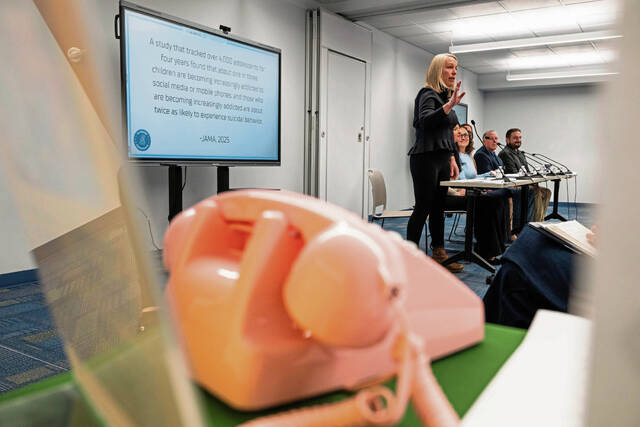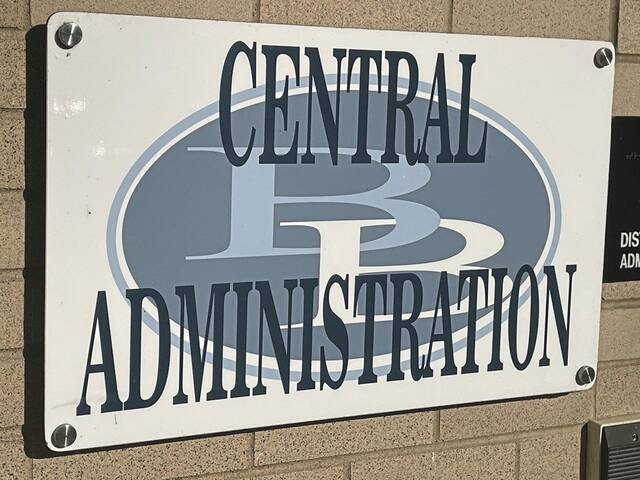Highlands School Board candidates in Region 2 said they will make school culture a priority if elected.
Three candidates — Shane Chesher, Debra Lehew and Jeff Thimons — will compete for two available four-year positions. Region 2 includes Brackenridge and parts of Harrison.
Bullying
With reports of bullying and conduct issues a recurring theme in the district, the candidates were asked how they would tackle the problem.
“Bullying often happens when students feel disconnected,” said Chesher, a Republican and maintenance worker from Harrison.
“When students feel like they belong and are part of a caring school community, they treat each other with more respect. As a school board, we should support programs that help students build friendships, learn empathy and understand the impact their actions have on others.”
Chesher, 38, said the district needs clear rules and consistent consequences so students understand what behavior is expected and what will happen if they break the rules.
“By focusing on connection, self-esteem and clear expectations, we can make our schools safer and more supportive for every student,” he said.
Lehew, a Democrat and school administrator from Brackenridge, said bullying is a concern for all stakeholders. She said preventative measures should be in place, along with strategic and ongoing training for all.
“Honest conversations about the culture in the district must happen, and it cannot just be one session,” said Lehew, 59. “We must evaluate effectiveness of programs and interventions as well. This will allow for systems and culture change.”
To address the issue, the district needs to ensure students learn expectations for their behavior, she said.
“We must be restorative in our practices and build strong family relationships to elicit a change to appropriate behavior,” Lehew said.
Thimons, an elementary school principal from Brackenridge, said student safety would be a priority. Administrators need to act immediately on reports of bullying, he said.
“Every student deserves to feel safe and respected at school. With that said, I and other school board members need to turn these reports over to the administration — as we should not be involved unless all the proper steps in the chain of command have been followed,” said Thimons, 50, a Republican. “We as a district need to listen, adapt, and hold ourselves accountable to the standard that every child deserves: a school where they feel safe, supported and ready to learn.”
Transparency
When asked about the perception that there’s a disproportionate amount of discipline and court involvement for minorities, candidates said the district needs to be transparent about the data.
“We must face the reality of the data each and every year, and we must implement with fidelity Positive Behavior Interventions and Supports as well as restorative practices to change the culture and create a space where students not only feel safe, but also engage in the learning opportunities,” Lehew said.
Data is shared with the school board that shows building discipline and safety, she said. The district should continue to analyze the data and report it annually, for not only the board but for the families and community members, she said.
“This will offer all an opportunity for honest conversations and strategic planning to occur,” Lehew said.
Chesher said the solution starts with clear data and consistent rules. When discipline is based on clear expectations that apply to every student, “we can make sure that behavior, not background, is what’s being addressed.”
“As a school board, we must make sure that rules are easy to understand, applied equally and explained clearly to students and parents,” Chesher said. “We should also look at the data regularly to see if certain groups of students are being disciplined more often and ask why. If we find patterns, we need to talk about them openly and work together to fix them.”
For Thimons, the issue requires the district to acknowledge that the concern is valid and serious. Data across many districts show disparities that can’t be ignored and the board has a responsibility to understand and address them, he said.
“We’ll need to review our discipline data by race, gender and disability to identify where disproportionality exists. Transparency is key,” Thimons said. “We’ll make that data public and use it to guide our next steps.”
It’s also not just about punishment statistics, he said. It’s about what’s happening before those moments.
The administration needs to look at classroom management support, cultural responsiveness in teaching, bias in referrals and whether all students feel heard and respected by the teachers and building administrators, Thimons said.
“We should also be working closely with our local law enforcement partners to ensure that schools remain places for learning and support, not pipelines to the judicial system,” he said.
Poor test scores
Test scores are often brought as concerns of parents to the school board, with the state reporting in 2024 that an average of 33% of district students are proficient or above in math and 44% proficient or above in reading.
Chesher said improving scores isn’t solely about testing. It’s about creating an environment where students want to learn and believe they can succeed, he said.
“As a board, we should work closely with educators to support teaching strategies that connect with students, especially in math and reading,” he said. “We should also make sure schools have the tools and resources they need to help every student grow. When we focus on connection, we build a stronger foundation for learning, and when students feel invested in their education, better results will follow. We also need to listen to students and families to understand what’s working and what’s not.”
Lehew said the board needs to prioritize student achievement, which requires approving a budget that is not only fiscally responsible but that focuses on student learning.
“No one program, no teaching approach, no one curricular resource works for every student,” Lehew said. “As a board, we must support a systems approach to instruction, enrichment and remediation. We must offer students learning opportunities that truly help them to achieve.
“Looking at the data to ensure all students are achieving, and if they are not, supporting efforts to grow the system is essential.”
Thimons said people need to understand that test scores are not the answer to public education. The district has several outstanding teachers and great students — and the goal should be for all students to succeed in every aspect of their education, he said.
“Those who believe schools should be graded solely on test scores likely have not experienced the reality of public education,” he said.
Testing represents only a snapshot in time, Thimons said.
“While we certainly want our students to do well academically, our true focus should be on student growth, academically, socially and emotionally, not on one isolated assessment,” he said.








